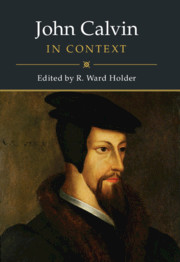Book contents
- John Calvin in Context
- John Calvin in Context
- Copyright page
- Dedication
- Contents
- Contributors
- Acknowledgments
- Abbreviations
- Introduction
- Part I France and Its Influence
- Part II Switzerland, Southern Germany, and Geneva
- Part III Empire and Society
- Part IV The Religious Question
- 19 Western Ideals of Religious Reform
- 20 The Luther Affair
- 21 Religious Colloquies
- 22 The Council of Trent and the Augsburg Interim
- 23 Biblical Scholarship
- 24 The Printed Word
- 25 Polemic’s Purpose
- 26 The Style of Theology
- 27 Baptism
- 28 The Eucharist
- 29 Predestination in Early Modern Thought
- 30 The Challenge of Heresy
- 31 Early Modern Christianity and Idolatry
- 32 Trinitarian Controversies
- 33 Nicodemism and Libertinism
- Part V Calvin’s Influences
- Part VI Calvin’s Reception
- Conclusion
- Bibliography
- Index
- References
32 - Trinitarian Controversies
from Part IV - The Religious Question
Published online by Cambridge University Press: 14 November 2019
- John Calvin in Context
- John Calvin in Context
- Copyright page
- Dedication
- Contents
- Contributors
- Acknowledgments
- Abbreviations
- Introduction
- Part I France and Its Influence
- Part II Switzerland, Southern Germany, and Geneva
- Part III Empire and Society
- Part IV The Religious Question
- 19 Western Ideals of Religious Reform
- 20 The Luther Affair
- 21 Religious Colloquies
- 22 The Council of Trent and the Augsburg Interim
- 23 Biblical Scholarship
- 24 The Printed Word
- 25 Polemic’s Purpose
- 26 The Style of Theology
- 27 Baptism
- 28 The Eucharist
- 29 Predestination in Early Modern Thought
- 30 The Challenge of Heresy
- 31 Early Modern Christianity and Idolatry
- 32 Trinitarian Controversies
- 33 Nicodemism and Libertinism
- Part V Calvin’s Influences
- Part VI Calvin’s Reception
- Conclusion
- Bibliography
- Index
- References
Summary
Sixteenth-century Protestant reformers did not reinvent the Trinity; most preserved the medieval understanding of the doctrine of God, which the church agreed upon at the First Council of Nicaea in 325 and revised at the Council of Constantinople in 381. The remarkable continuity of the medieval consubstantial Trinity during the Reformation became increasingly relevant to framing standard Reformed theology as certain minds began to fancy antitrinitarianism. The consensus among the magisterial reformers was that sixteenth-century nonconformist “heretics” endangered traditional Christology and therefore the traditional Christian doctrine of God. At the inception of Protestant dogma, reforming theologians were forced to assess an old question of the utmost relevance to the church: If Christ is not human and divine – what is Christianity? Thus, putting the relation of God, the Son, and the Holy Spirit into words from a scriptural perspective occupied the reformers as it had the early church fathers. The early reformers who revisited church doctrine should have enjoyed a period of trial and error. However, in the broader Reformation context, the sixteenth-century characters, who pushed the orthodox envelope beyond tradition, had by the mid-sixteenth century compelled the reformers to exacting linguistic precision, which subsequently became a distinctive trait of Reformed theology.
- Type
- Chapter
- Information
- John Calvin in Context , pp. 278 - 286Publisher: Cambridge University PressPrint publication year: 2019

